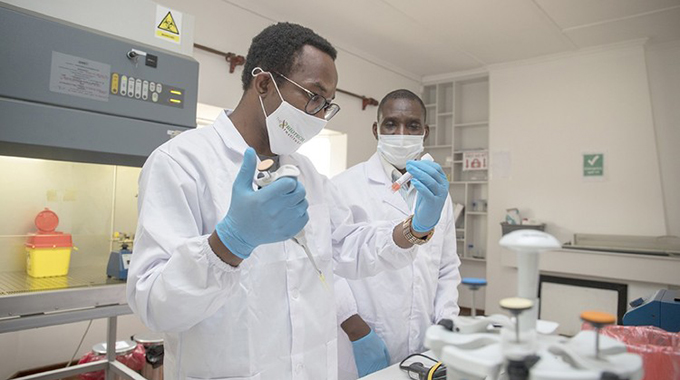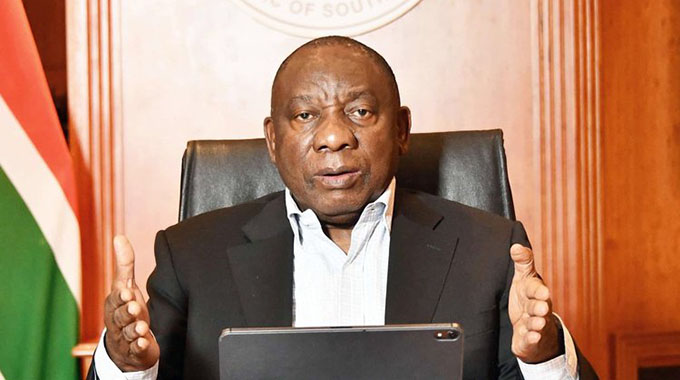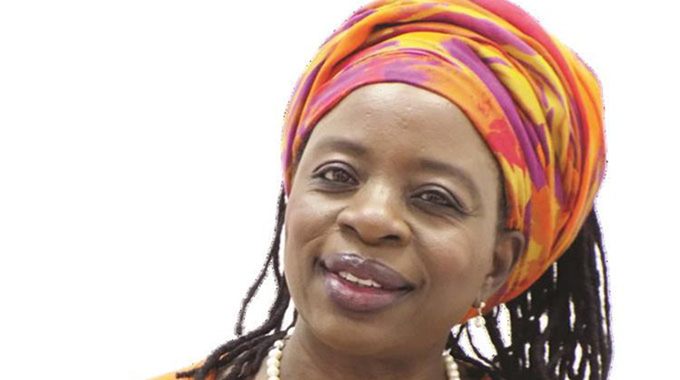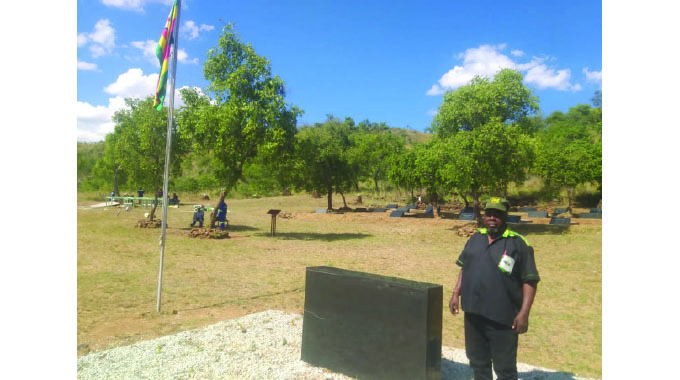‘We have to think big’

Lovemore Chikova
Development Dialogue
The Biotech Institute founder and chief executive Professor Brighton Samatanga is a typical example of how those in the diaspora can contribute to the development of Zimbabwe. Prof Samatanga, a molecular biophysicist, has seen it all in the world of biotech research, with experience in countries in Europe. He has returned home armed with the knowledge to set up the research institute in Harare that will provide innovation and solutions to many areas of biotech. In this interview, Prof Samatanga (BS) says it is the duty of Zimbabweans to spearhead the development of the country, with foreigners coming in only as partners and providing expertise where their skills are needed. Read on…
Q: Can you start by telling us your background and how you ended up in the field of biotech?
BS: Well, it is a long story that started with me attaining 11 As at Ordinary Level and then 18 points at A Level in MPCB (Maths, Physics, Biology and Chemistry). I then enrolled at Jacobs University Bremen in Germany where I did a Bachelors Degree in Biochemical Engineering from 2004 to 2007. I did my masters degree at the same university in the field of Biological Recognition/Life Sciences from 2007 to 2008. I then went to ETH Zürich and University of Zürich where I did my PhD in Biophysics in the field of molecular biophysics from 2008 to 2012. My research was on protein — nucleic acid interactions.
I then worked at the University of Leipzig in Germany.
Q: How did the idea of setting up this research institute came?
BS: One day, my professor for bio-chemical engineering asked me a question. He said: ‘Why is it that Africans have never created anything?’ The fact that I still remember this question to this day means it was a very poignant question. I realised that we have to think big as Africans and Zimbabweans in particular. But I think we already do a lot of things as Africans. We develop a lot of things, but we never get credit for it. We work under certain supervisors and if you create or make something they get credit for it. Or we simply do not have the resources, and this the major issue, especially this side. You have fantastic ideas but you don’t have the resources to pursue the whole idea that you have. Maybe you get resources to implement part of the idea, but part of the idea doesn’t take you the whole way. Or you have to reduce the idea to a less complex thing palatable to the sponsor.
Q: It seems like the system is frustrating. Is this what made you return home?
BS: In October 2019, I felt I wanted to build a circle of cooperation and wanted to be positive and push my country forward. That is when I came back. I was also having my wedding. On return, that is when I registered this institute. When Covid-19 started, that is when I intensified work. I would send equipment home, come back, go into quarantine and go back to source the equipment.
I then got the permit to start working in August 2020, and now we are fully operational. The project is self-funded and it is unfortunate they do not offer tax rebates on our equipment, we have to pay full tax. I think they should consider a waiver for research equipment. We can pay taxes for the commercial side, but for research equipment, there is need to waiver taxes. I view myself as an investor. The diaspora should come back home to invest and we should be treated as investors.
Q: What work are you doing at this institute that you think will help push the country forward in terms of biochemical?
BS: We have three different areas – research, education and technical services. I am trying to work a new concept whereby you can run a self-sustainable institution which can fund its own operations. Of course, we want to apply for grants going forward if necessary.
But for grants they will say they are giving you for studying an area say for two years. When you are at the pick of the research they tell you the grant is finished. They determine what we should study and for how long. I don’t like that concept.
The idea of technical services is that we want to provide all the bio-analytical services for a commercial fee, then plough profits into the research sector. Research consumes a lot of money and it is difficult for Government or whoever to support research.
In technical services we have molecular diagnostics, Covid-19 PCR testing, clinical diagnostics — tests for sugar, blood etc, we have all the equipment and all the capacity to do all that. We can also do water testing, food testing for micro biology. We even have STD tests. We can test six different STDs with PCR and in 35 minutes you can get your results. Some send the samples to South Africa.
We have PCR-based tests targeting sepsis in women who give birth. Mostly our tests are based on what we call genomics PCR testing sequencing based testing. We have partnerships with sequencing companies, but we will buy our own machine directly from Italy for that. It’s cheaper than to buy through other countries like South Africa.
We are saying if government has issues like how to legislate breeding of crops in these new technologies and the like, we are there to advise, we are used to the technology.
On distribution, we just have had our account approved with Procurement Regulatory Authority of Zimbabwe. We are saying if government wants to buy equipment or consumables, we can advise, we have been there. Usually they buy from people here who have not been exposed and they are just agents for a particular company.
We are also applying for a licence for the processing of medicinal cannabis. At this institute we can process anything bio or biomedical in our laboratory. We can process mbanje, purifying the leaf and taking the material with a pain relief is a simple laboratory process, so we are going there. Our model is that we just go to the farmers because they cannot do laboratory processes. We can see which variety of mbanje produces certain effects. It’s not one component of mbanje which produces certain effects, it’s a different combination and mbanje is different from each country and different places.
Q: What else can you do at this institute?
BS: We also want to do paternity tests and DNA tests. Cancer is something that I am very much interested in, especially pre-diagnosis. We have no capacity to treat people and rate at which people are getting cancer is increasing. We would want to do more in that field. There is a company we are combining with in Italy because we do not have the capacity here to do that and we also need their experience. So we need that partnership to gain experience, to know what they know so that we don’t recreate, relearn what they have learnt. The whole idea is not to redo what somebody did. We want to be toe-to-toe with our European and American partners. We want to start where they are, going forward. They have their different models on how to study cancer before it strikes and so forth.
We are doing research on bioinformatics, it’s not our main, but it’s one of the things we are going to do. Bioinformatics is the cheapest, but most powerful thing you can do. You just need a computer, that’s it. If you need somebody to learn to programme, they can just google. There is free programming language. We want to carry out studies in drug discovery using bioinformatics and sequencing data. If there is a mutation — the Indian variant — in Zimbabwe you just publish it and that is all. But that is where you should be starting. So we get a gene and there are mutations and changes to genetic material, we look at what does that mean on the virus protein. How does it affect the vaccine being used to target that protein? So you analyse which vaccine might work. That is what we are supposed to do in our research institutions. This can help us to come up with a vaccine or a drug that is effective.
Q: Before we started the interview, you were talking about a new research tool called CRISPR/Cas. Tell us how it will help transform the way of doing business and research in Zimbabwe.
BS: The tool is already being used in plants and they are trying to use it to cure HIV. In Zimbabwe we want to use it for anti-microbial resistance research. You can use CRISPR/Cas to fight MAR resistance. It’s a tool that I would also want to bring here. It can cut where you want, so it can kill specific types of cells, target specific things. Say such type of bacteria has a resistance gene, you just target it at the bacteria and kill all anti-biotic resistance. We were trying to learn the research tool at Leipzig, we were trying to clean it. And that is where I got an interim position as a full professor for physical and biological soft matter.
With CRISPR/Cas you, it’s a gene editing tool — you can do genetic manipulation within the cell. The discovery of this tool won the Noble Prize in Chemistry last year. It is a cheap way to kill diseases. In fact, CRISPR has significant biomedical implications. It can cure a lot of genetic diseases. We are trying to use it for blind people, trying to cure HIV with it, there are studies which have been done and it’s a cheap tool. They patented the tool, but I do not want patent. CRISPR/Cas can be developed in different ways and people are discovering more and more about it.
Q: So, what does the future hold for the country in terms research?
BS: We want to take research all the way, where we can actually say we start from understanding something, we understand it all the way and then we try to develop an intervention and on the intervention we need something that is patentable because we want to make money.
Antimicrobial resistance, we want to understand it, we want to see what it means, how it actually occurs and we want to see drug development using both experimental techniques – sequential or PCR, whatever we have, and also using bio-informatics. We want to develop our own software. Right now we have our software for Covid-19 and you can easily get your data, it’s a very simple interface. You just input and do our certificate and a get a QR code and if it is scanned anywhere it comes out. We programmed our own saver, we have our own data base and we have even our own app which we are developing.
Q: Let us revisit patents. What is your view on them and how to do you expect to negotiate your way around them?
BS: We do not want other people to come from outside and grow big here and then start patenting our products. There are teas like mutsine, but have been patented in Europe. Teas like zumbani, we using it for emergency, but there has to be a proper paper on how it can be exploited for medicinal purposes.
Study it in test tubes and see how it acts, study it in the cells and see how it acts, put it in a mouse and see how it acts, in a monkey and see how it acts and then human clinical trials. It’s all great, but you cannot patent natural products. People have to understand how patents work. You have to look at extract, look out in that extract which molecule is the one that is actually active. There are many different molecules some are actually negative. Which one is actually working, then you isolate it, then you try it, but it’s still a natural molecule. You make it better and change it to be more effective. Then you have something that you have invented, different from the original and you can now patent it.
This also comes with the harnessing of traditional medicines. We have plants we are interested in. Plants like flame lily, it’s one example. It has very particular pharmaceutical products.







Comments